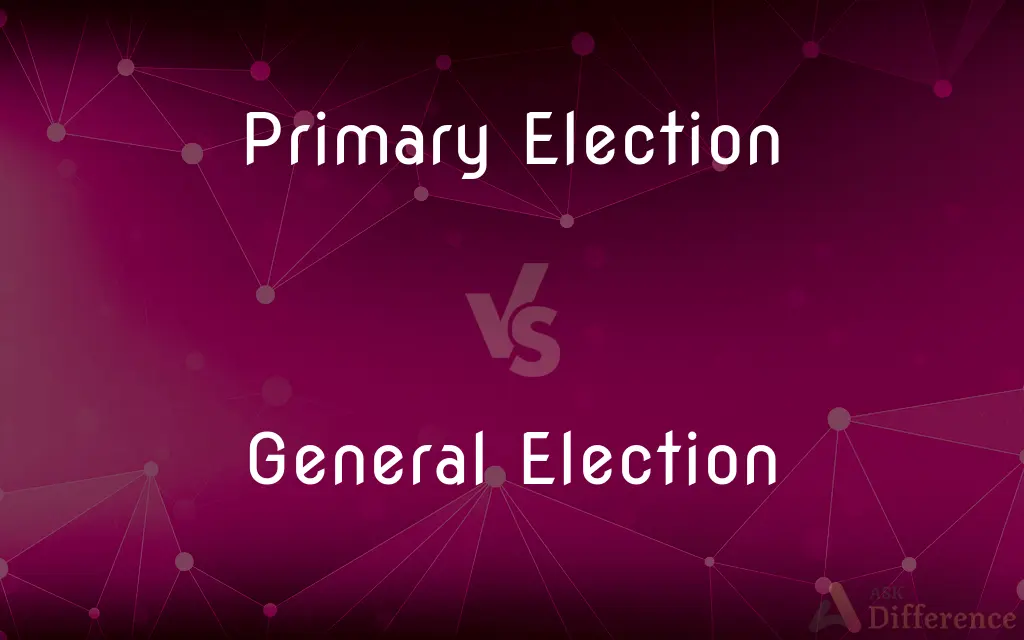Primary Election vs. General Election — What's the Difference?
Edited by Tayyaba Rehman — By Maham Liaqat — Published on April 3, 2024
Primary elections are intra-party contests to select candidates for the general election, focusing on party members' choices. General elections determine office holders from among all party candidates, deciding who ultimately assumes office.

Difference Between Primary Election and General Election
Table of Contents
ADVERTISEMENT
Key Differences
Primary elections serve as preliminary contests within political parties, where party members vote to choose their candidates for the upcoming general election. They can be open, closed, or semi-closed, affecting who is eligible to vote based on party affiliation. General elections occur after the primary phase, where candidates from all parties compete against each other, and voters from the entire electorate decide who wins the public office.
The purpose of a primary election is to narrow the field of candidates within a party, fostering party unity and strategy for the general election. In contrast, the general election is the final electoral process where the public elects government officials, such as the president, senators, and representatives, among candidates from different parties.
Primaries can vary widely in their format, including closed primaries, where only registered party members can vote, and open primaries, allowing any voter to participate regardless of party affiliation. This system allows parties to gauge candidate viability and set their platforms. Conversely, general elections typically follow a more standardized format across the country, focusing on broader electoral participation without party restrictions.
Eligibility to vote in primaries versus general elections can differ, with some states requiring voters to be registered with a party to participate in its primary. However, in the general election, all registered voters can participate, making it a more inclusive electoral event.
The outcomes of primary elections influence the strategic decisions and policies of political parties, shaping their platforms and approaches for the general election. The general election outcome determines the actual holders of public offices, directly impacting governance and policy direction.
ADVERTISEMENT
Comparison Chart
Purpose
Select party candidates for general election.
Elect office holders from among all party candidates.
Participants
Party members or registered voters, depending on the primary type.
All eligible voters regardless of party affiliation.
Outcome
Determines party candidates.
Determines winners of public offices.
Types
Closed, open, semi-closed, etc.
Standardized format across different regions.
Voter Eligibility
May be restricted by party affiliation.
Open to all registered voters.
Impact
Influences party strategy and unity.
Determines government leadership and policy direction.
Frequency
Occurs before the general election.
Follows primary elections in the electoral cycle.
Voting Options
Limited to candidates within a voter's party (in closed primaries).
Includes candidates from all parties.
Compare with Definitions
Primary Election
An election within a party to select candidates for the general election.
She voted in the primary election to choose her party's gubernatorial candidate.
General Election
Open to all registered voters.
Regardless of party, everyone could vote in the general election.
Primary Election
Focuses on party members' preferences.
The primary election reflected the party members' desire for change.
General Election
The final election where all parties' candidates compete.
She campaigned vigorously until the general election day.
Primary Election
Can be closed, open, or semi-closed, affecting voter eligibility.
In the open primary election, he could vote despite being independent.
General Election
Determines who assumes public office.
The general election resulted in a new mayor for the city.
Primary Election
Determines which candidates represent their party.
The primary election was crucial for selecting the most viable candidate.
General Election
Decides government leadership and policy direction.
The general election shaped the country's course for the next four years.
Primary Election
Leads up to the general election.
Winning the primary election was the first step toward the November general election.
General Election
Follows the primary elections in the electoral cycle.
After the primaries, candidates focused on the general election.
Common Curiosities
What is a closed primary?
A closed primary is an election where only registered party members can vote to choose their party's candidates.
Why are general elections important?
General elections are crucial because they determine who will hold public office and make decisions affecting the government's direction and policies.
What is the main difference between a primary and a general election?
The primary election is a party-specific process to select candidates for the general election, which determines the winners of public office from all party candidates.
Is voter turnout different between the two elections?
Typically, voter turnout is higher in general elections than in primary elections.
Can independents vote in primary elections?
It depends on the state's rules; in open primaries, independents can vote, but in closed primaries, only registered party members are eligible.
What's an open primary?
An open primary allows voters to choose which party's primary they want to participate in, regardless of their own party affiliation.
What happens if no candidate wins a majority in a primary?
Some states require a runoff election between the top candidates if no one achieves a majority.
How often do general elections occur?
In the United States, general elections for federal offices occur every two years, with presidential elections every four years.
Why might someone prefer an open primary?
Open primaries allow more voter participation by letting independents and members of other parties have a say in candidate selection.
How are primary election dates decided?
State laws and party rules determine primary election dates, which can vary significantly across states.
What role do delegates play in primary elections?
In presidential primaries, delegates are chosen based on primary election outcomes to represent candidates at party conventions, where the official nominee is selected.
Can a primary election result be contested?
Yes, candidates can contest primary election results if they believe there were irregularities or errors.
Do all states have primary elections?
Most states have primary elections, but some may use caucuses or conventions for candidate selection.
Can a candidate lose a primary but win in a general election?
Usually, losing a primary means the candidate cannot run in the general election, except as a write-in candidate or if running under another party or as an independent.
How do primary elections affect general elections?
Primary elections determine the candidates who will represent their parties in the general elections, influencing campaign strategies and voter choices.
Share Your Discovery

Previous Comparison
Labrador vs. Golden Retriever
Next Comparison
Generator vs. InverterAuthor Spotlight
Written by
Maham LiaqatEdited by
Tayyaba RehmanTayyaba Rehman is a distinguished writer, currently serving as a primary contributor to askdifference.com. As a researcher in semantics and etymology, Tayyaba's passion for the complexity of languages and their distinctions has found a perfect home on the platform. Tayyaba delves into the intricacies of language, distinguishing between commonly confused words and phrases, thereby providing clarity for readers worldwide.
















































